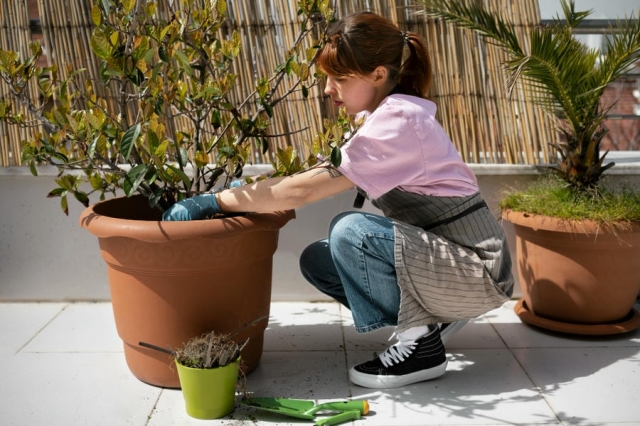Gardening at home has become one of the most popular and rewarding hobbies in recent years. Whether you have a spacious backyard, a terrace, or just a small balcony, gardening allows you to create a green oasis while enjoying fresh air, stress relief, and even homegrown vegetables. For beginners, the process may seem overwhelming at first, but with the right tips for gardening at home, you can easily nurture healthy plants and enjoy a sustainable lifestyle.
This article highlights practical, natural, and eco-friendly ways to make your home garden thrive.
Why Gardening at Home is Beneficial
Before diving into the tips for gardening at home, it's worth noting why this activity is so enriching:
-
Healthier Lifestyle: Gardening promotes physical activity and mental relaxation.
-
Fresh Produce: You can grow your own vegetables, herbs, and fruits without harmful chemicals.
-
Eco-Friendly: Growing plants contributes to reducing pollution and enhances biodiversity.
-
Aesthetic Appeal: A green corner adds beauty and positivity to your living space.
Top Tips for Gardening at Home
Here are simple and effective gardening practices to help beginners and enthusiasts alike.
1. Choose the Right Plants
Start with plants that are easy to grow and suit your local climate. Beginners can go for herbs like mint, coriander, and basil, or vegetables such as spinach and tomatoes. Low-maintenance indoor plants like money plant, aloe vera, and snake plant are also great options.
2. Use Quality Soil
Good soil is the foundation of any healthy garden. Opt for nutrient-rich, well-drained soil. If your local soil is heavy or clay-like, mix it with compost, sand, or coco peat to improve aeration and fertility.
3. Water Smartly
Overwatering is a common mistake. Water your plants in the early morning or late evening to prevent evaporation. Ensure the soil is moist but not soggy. For container plants, check drainage holes to avoid root rot.
4. Provide Adequate Sunlight
Most plants require at least 4–6 hours of sunlight daily. Place sun-loving plants like tomatoes, chili, and okra on balconies or terraces, while shade-loving plants like ferns and peace lilies can be kept indoors.
5. Add Organic Compost
Use kitchen waste like vegetable peels, tea leaves, and fruit scraps to prepare homemade compost. This reduces waste and provides natural nutrients for your plants, encouraging faster and healthier growth.
6. Control Pests Naturally
Avoid chemical pesticides. Instead, try natural remedies like neem oil spray, soap water, or garlic spray to keep pests away. Growing companion plants such as marigolds also helps deter insects naturally.
7. Use Proper Containers
If you're gardening in small spaces, select the right pots or grow bags. Ensure they have drainage holes and are big enough for root growth. Clay, ceramic, or recycled containers can all work well.
8. Prune and Trim Regularly
Pruning helps plants grow bushier and healthier. Remove yellow leaves, dead branches, and weeds regularly. This allows the plant to focus its energy on new growth.
9. Mulching for Moisture
Cover the soil surface with dry leaves, straw, or grass clippings. Mulching helps retain moisture, keeps the soil cool, and prevents weed growth.
10. Be Patient and Consistent
Gardening is a journey that requires time and care. Don't expect instant results. With regular watering, sunlight, and attention, your plants will eventually thrive.
Gardening in Small Spaces
If you live in an apartment with limited space, don't worry—gardening is still possible:
-
Use vertical gardening techniques with hanging pots and wall planters.
-
Try container gardening with pots on balconies.
-
Opt for herb gardens in kitchen windowsills.
-
Use recycled bottles, cans, or jars for growing small plants.
Natural Benefits of Gardening at Home
-
Air purification: Indoor plants like spider plants and peace lilies improve air quality.
-
Stress relief: Spending time with plants reduces anxiety and boosts mood.
-
Family bonding: Gardening can be a shared activity that brings families closer.
-
Learning experience: Kids learn responsibility and the importance of nature.
FAQs on Tips for Gardening at Home
Q1. What are the easiest plants to grow at home for beginners?
Herbs like coriander, mint, and basil, along with leafy vegetables like spinach and lettuce, are easiest for beginners.
Q2. How can I make my plants grow faster naturally?
Provide them with good soil, enough sunlight, regular watering, and organic compost. Mulching also improves soil health and speeds up growth.
Q3. Can I start gardening at home without a backyard?
Yes! You can grow plants in pots, containers, or grow bags on balconies, terraces, or even windowsills.
Q4. What is the best time to water plants at home?
Early morning and late evening are the best times, as water doesn't evaporate quickly.
Q5. How do I prevent pests in my home garden?
Use natural pest repellents like neem oil, soap spray, or garlic spray. Also, keep your garden clean and avoid stagnant water.
Final Thoughts
Gardening doesn't need expensive tools or vast spaces. With these simple and effective tips for gardening at home, you can create a green corner that not only looks beautiful but also supports a healthier lifestyle. Start small, be consistent, and enjoy the satisfaction of watching your plants grow naturally. Over time, your garden will reward you with fresh produce, cleaner air, and a calming environment that enriches your daily life.






